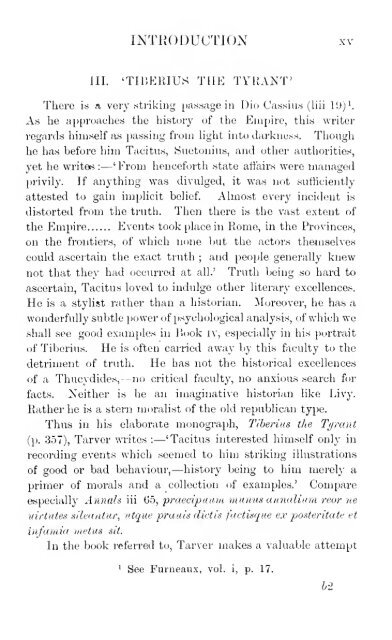You also want an ePaper? Increase the reach of your titles
YUMPU automatically turns print PDFs into web optimized ePapers that Google loves.
INTRODUCTION xv<br />
III. 'TIBERIUS THE TYRANT'<br />
<strong>The</strong>re is a very striking passage iu Dio Cassius (liii 19) '.<br />
As he approaches the history <strong>of</strong> the Empire, this writer<br />
regards himself as passing from light into darkness. Though<br />
he has before him Tacitns, Suetonius, and other authorities,<br />
yet he writes:— 'From henceforth state affairs were managed<br />
privily. If anything was divulged, it was not sufficiently<br />
attested to gain implicit belief. Almost every incident is<br />
distorted from the truth. <strong>The</strong>n there is the vast extent <strong>of</strong><br />
the Empire Events took place in Rome, in the Provinces,<br />
on the frontiers, <strong>of</strong> which none but the actors themselves<br />
could ascertain the exact truth ; and people generally knew<br />
not that they had occurred at all.' Truth being so hard to<br />
ascertain, <strong>Tacitus</strong> loved to indulge other literary excellences.<br />
He is a stylist rather than a historian. Moreover, he has a<br />
wonderfully subtle power <strong>of</strong> psychological analysis, <strong>of</strong> which we<br />
shall see good examples in Book iv, especially in his portrait<br />
<strong>of</strong> Tiberius. He is <strong>of</strong>ten carried away by this faculty to the<br />
detriment <strong>of</strong> truth. He has not the historical excellences<br />
<strong>of</strong> a Thucydides,—no critical faculty, no anxious search for<br />
facts. Neither is he an imaginative historian like Livy.<br />
Rather he is a stern moralist <strong>of</strong> the old republican type.<br />
Thus in his elaborate monograph, Tibenus the Tyrant<br />
(p. 357), Tarver writes :— '<strong>Tacitus</strong> interested himself only in<br />
recording events which seemed to him striking illustrations<br />
<strong>of</strong> good or bad behaviour,—history being to him merely a<br />
primer <strong>of</strong> morals and a collection <strong>of</strong> examples.' Compare<br />
especially Annals iii Qb, praecipMum munus annalium reor ne<br />
uirtutes sileantur, ntque prauis dictis factisque ex posteritate et<br />
infamia metiis sit.<br />
In the book referred to, Tarver makes a valuable attempt<br />
' See Furneaux, vol. i, p. 17.<br />
62

















